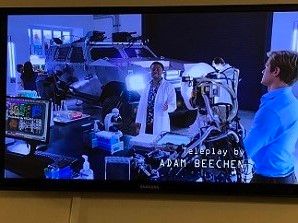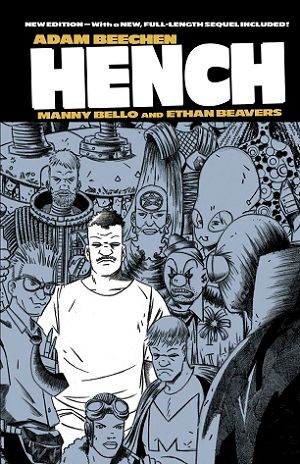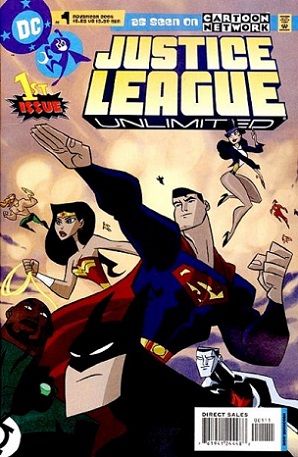 First Comics News: Why do you enjoy writing for TV?
First Comics News: Why do you enjoy writing for TV?
Adam Beechen: I love telling stories. Like most others, I grew up on television and the stories it told me, and I wanted to be part of that magic, sharing stories with the world. Television was especially appealing because, if you write features and you’re really, really excellent at it, you may see your work on the big screen once every four or five years at best. In television, where there are multiple episodes in a season, you might see your work on the small (are there still small screens?) screen a couple of times a year and that’s very fun.
1st: What first convinced you you wanted to be a writer?
Adam: Comic books! Comics fired my imagination. My Dad brought me a Spider-Man comic after a business trip, and I was hooked from that moment on. I loved the stories, the character interaction, the costumes, the excitement, and the drama. The names in the credit boxes became characters to me almost as much as the heroes and villains did. I was fascinated by them. How did those writers get there? It seemed impossible, but I loved writing so much, that I pursued what I thought was the most pragmatic approach to a career in writing – I studied journalism. I enjoyed it, but it wasn’t as creative as I wanted it to be, so I thought about television. I went to film school, moved to Los Angeles, and I’m still here today.
 1st: What were your duties on “LEGO Jurassic World”?
1st: What were your duties on “LEGO Jurassic World”?
Adam: I was credited as “Executive Producer,” but my job was really one of a head writer. I took LEGO’s concept for the series and developed it with LEGO executives and other writers, then broke the season down into individual episodes and supervised the writers working on those scripts. I also wrote a few myself. From there, I contributed notes from time to time in the production process, and I sat in on the voice recordings in case any lines needed rewriting in the moment.
1st: Do you think Legos are still a top-selling toy?
 Adam: I know for a fact they are. LEGO has done an astonishing job of innovating its product over the decades, not only to attract new fans but also to keep the fans who grew up loving the brand. You can still play with LEGOs as you always have, but now the sets and kits that are available appeal to a much wider range of customers with all sorts of interests. LEGO offers something for everyone.
Adam: I know for a fact they are. LEGO has done an astonishing job of innovating its product over the decades, not only to attract new fans but also to keep the fans who grew up loving the brand. You can still play with LEGOs as you always have, but now the sets and kits that are available appeal to a much wider range of customers with all sorts of interests. LEGO offers something for everyone.
1st: While working on “Transformers: Robots in Disguise” which character most stood out for you?
Adam: For me, it was Bumblebee, because it was a joy to chart his journey from soldier to leader. He took a loose group of very different Autobots and helped guide them not only to becoming a team but a sort of family. And for all the frustrations and tribulations he faced, he turned out to be a pretty good bot-in-charge.
 1st: How is writing animation shows different than writing a comic book?
1st: How is writing animation shows different than writing a comic book?
Adam: I’d say it varies depending on the writer, and it comes down to how much you “direct on the page,” meaning the level of description of the action and setting. In comics, while there are a couple of different ways writers and artists work together depending on the personalities involved, there tends to be a lot more direction on the page. Comic writers sometimes don’t know who’s going to be drawing their scripts, so they take a little more care to get their vision across and spell things out. Some writers are just more descriptive than others. Alan Moore, famously, writes extraordinarily long scripts for his comics, specifying every detail. But other writers, who may have worked with the same artists for a long time, know those artists’ skills at interpretation and might leave some of that detailed work in their hands.
 In animation, there’s more direction on the page than in a live-action script, but it still should be reasonably bare-bones, unless the writer has a very specific shot in mind. As a writer, I want to leave room for the director and storyboard artists to change something for the better, or express their creativity should something come to mind. In those instances, I’ll communicate a little more closely and personally with the artist, so we can agree on what’s best for the story.
In animation, there’s more direction on the page than in a live-action script, but it still should be reasonably bare-bones, unless the writer has a very specific shot in mind. As a writer, I want to leave room for the director and storyboard artists to change something for the better, or express their creativity should something come to mind. In those instances, I’ll communicate a little more closely and personally with the artist, so we can agree on what’s best for the story.
1st: You created a graphic novel called “Hench” What was it about and what type of reader will like it?
Adam: HENCH is about supervillain henchmen, how they get into the career, and why they stay in it. It’s an insane career to pursue when you think about it. Ninety-five percent of the time, a henchman winds up beaten up and in jail. What would drive someone to choose that? The story follows one henchman, and it’s told from his point of view, so the reader gets a different perspective on the world of superheroes, and basically, that perspective is, “All of these people are crazy.” It pays homage to a lot of famous comic images and touches on a lot of tropes that will satisfy long-term readers of comics, but it’s designed to be an entertaining story on its own that a reader doesn’t need to know a lot about superheroes and supervillains to understand and appreciate. P.S. It’s available on Amazon.com!
 1st: Have you ever had writer’s block and how do you get past it?
1st: Have you ever had writer’s block and how do you get past it?
Adam: The best advice I’ve heard about this specific topic is something I’ve done many times… and it’s worked. If you’re stuck for ideas as a writer, go to a newsstand or bookstore, and buy three magazines you wouldn’t ordinarily read. If you like Sports Illustrated, Time, and Rolling Stone, pick up Popular Mechanics, Modern Bride, and National Geographic instead. Then just page through them and free-associate based on what you see — Don’t read the articles, but take in the headlines, photos, and ads. It’s information you’re not used to receiving based on topics you don’t know much about. What ideas come to mind? Frequently, you’ll finish with two or three nuggets worth developing.
 1st: What is the best piece of advice you have for a new writer?
1st: What is the best piece of advice you have for a new writer?
Adam: Pretty simple: Always be writing. It’s just common sense. The more you write, the better you’ll get. And you’ll be ready if anyone ever asks you, “Do you have any samples I can read?” Find a couple of people whose opinions you trust and share your work with them to see if they have any thoughts. But always have a project you’re working on, and see that project through. Create a writing routine for yourself and stick to it. It’s like going to the gym. It develops into a habit to the point that you miss it if you don’t do it.
1st: What writing assignment did you enjoy working on the most?
 Adam: In comics, I loved, loved, loved writing DC’s Justice League Unlimited book, which I did for more than two years. While I had to have some knowledge of the animated series’ storylines, I wasn’t beholden to continuing them. My approach was to focus on a different character in every issue and then surround them with the other heroes, so the stories were very personal with team action. Often, I was able to bring in lesser-known characters who didn’t necessarily get a lot of screen time when the series was on the air, characters like B’Wana Beast, Gypsy, Metamorpho, and Black Lightning. the basic idea of the series was that just about every hero in the DC Universe was part of the Justice League, so I hoped to introduce fans to some characters they might not know much about otherwise.
Adam: In comics, I loved, loved, loved writing DC’s Justice League Unlimited book, which I did for more than two years. While I had to have some knowledge of the animated series’ storylines, I wasn’t beholden to continuing them. My approach was to focus on a different character in every issue and then surround them with the other heroes, so the stories were very personal with team action. Often, I was able to bring in lesser-known characters who didn’t necessarily get a lot of screen time when the series was on the air, characters like B’Wana Beast, Gypsy, Metamorpho, and Black Lightning. the basic idea of the series was that just about every hero in the DC Universe was part of the Justice League, so I hoped to introduce fans to some characters they might not know much about otherwise.
1st: What is the last thing you wrote?
 Adam: I’ve just finished an outline for an episode of a new animated series I can’t talk about yet. We’re hoping the series is approved soon and I can get started on the script!
Adam: I’ve just finished an outline for an episode of a new animated series I can’t talk about yet. We’re hoping the series is approved soon and I can get started on the script!
1st: What is next in your career?
Adam: I’m hard at work on a live-action television pilot. It’s a one-hour drama that takes place in the Old West. Some will tell me that I shouldn’t do that – Westerns are expensive, they don’t do well in the marketplace, and so on – but it’s a story I’m passionate about telling, so I’m just plowing ahead. Who knows what the marketplace will be like when I finish? Maybe the passion in the storytelling will show through and convince a studio or production company to take a chance on it. The bottom line is that it definitely won’t be bought or produced if I don’t write it, so I might as well. The worst answer I can get is, “No,” and that won’t kill me.
 1st: Do you have any favorite sports teams?
1st: Do you have any favorite sports teams?
Adam: I’m a huge fan of my hometown basketball team, the Phoenix Suns. I pretty much bleed purple and orange… which can be a big shock to my doctors.
1st: What would you like to say to all the people who have enjoyed your work?
Adam: Thank you! Thanks for spending some of your valuable free time and/or money on the stories I’ve been able to put out there. That’s a lot to ask because you have (theoretically) limited amounts of both. I hope to be able to continue to bring you fun, entertaining, and exciting stories for years to come.
